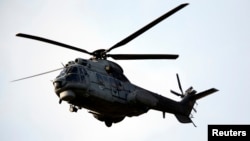Turkey’s move to join in the campaign against the group known as the Islamic State, while simultaneously bombing Kurdish fighters associated with the Kurdistan Workers Party (PKK), is again highlighting a critical obstacle to U.S. efforts in the region.
“We need to get all sides to agree that the main enemy is ISIL,” a defense official told VOA on condition of anonymity, using an acronym for the Islamic State.
But so far, that has not happened. The U.S. is struggling to forge a cohesive coalition out of groups operating on loose and sometimes shifting alliances. Fears are growing that as Turkey and these other groups pursue their own agendas, it is the Islamic State that stands to benefit.
In the case of Turkey, a U.S. ally, not even a string of suicide bombings linked to the Islamic State has been enough to convince officials there that degrading and defeating the group must be priority number one.
“They’re coming in that direction,” the defense official said. “I don’t know if they’re quite there.”
For now, U.S. and Turkish officials continue to hammer out the details of a deal that will allow the U.S. coalition to use air bases in Turkey to launch strikes against IS. One official described the start of those strikes as still being “a ways away.”
PKK Strikes
In the meantime, there are concerns that Turkish airstrikes against the PKK, will weaken the ability of Kurdish forces to continue their success against the Islamic State on the ground in both Syria and Iraq.
“It will definitely have impact on our struggle against Daesh because now Daesh enjoys, let’s say, air support from Turkey in its fight against the Kurds,” said Zagros Hiwa, a spokesman for the Kurdistan Communities Union (KCK), using the Arabic acronym for the Islamic State.
The Kurdistan Communities Union, an umbrella group that includes the PKK, says the lines separating different groups of Kurdish fighters are less than clear.
Hiwa said PKK fighters, along with Kurdish Peshmerga fighters, have been instrumental in efforts to counter the Islamic State in places like Kirkuk, Irbil, Kobani and Sinjar.
“Turkey has now decided to fight directly with the Kurds but uses ISIL as a cover to hide its real intentions,” he said.
U.S. backs Turkey's actions — so far
So far, officials in Washington have voiced support for Turkey’s actions, noting the U.S., along with NATO and several Western countries, lists the PKK as a terrorist organization.
"If the PKK did not launch a series of attacks in Turkey, Turkey would not be attacking the PKK,” a senior Obama administration official said earlier this week. “The triggering event here were the attacks from the PKK on Turkish soil killing a number of Turkish police officers and soldiers, and we’ve seen more since.”
Still, it is the type of overall problem the U.S. would rather not have as it tries to degrade and defeat the Islamic State.
“We need to make sure we are aligned in our efforts,” the U.S. defense official said.




